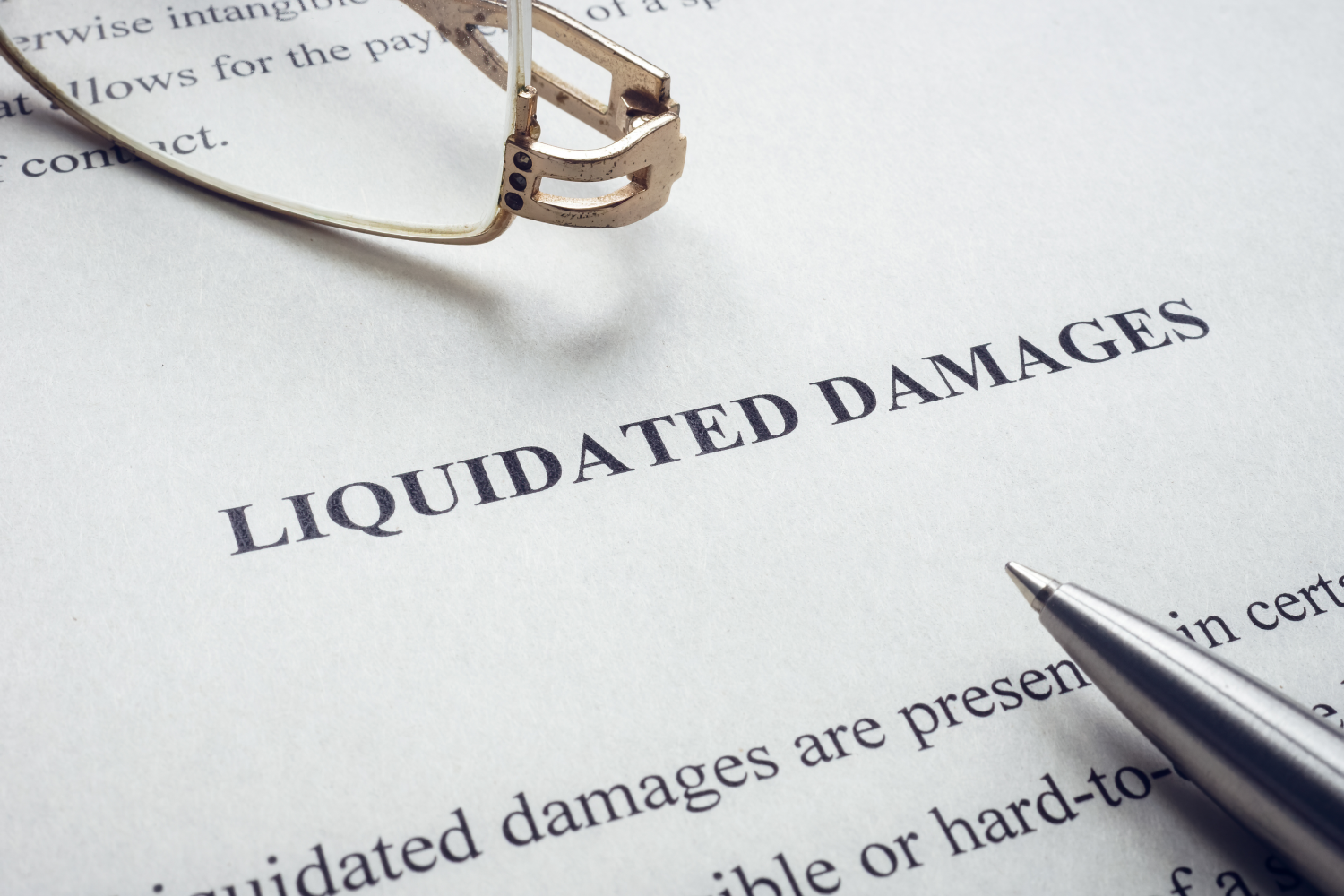Business contracts are complex and multifaceted. In many cases, they even include predefined damage amounts or penalties for losses that might be hard to quantify. These predefined damage amounts are called “liquidated damages.”
Let’s take a closer look at what liquidated damages are, how they work, and what situations they apply to. If you’re curious about whether you may be liable for liquidated damages, contact Schwartzapfel Lawyers today at 1-516-342-2200 or online for a free consultation, case evaluation, and so much more!
What Are Liquidated Damages?
Liquidated damages are predetermined, predefined penalties or damage awards outlined in legal contracts. For example, if two (2) companies agree to a business partnership, the contract outlining their responsibilities might include one (1) or more liquidated damage clauses.
In one (1) of those clauses, the companies agree that if someone misses a delivery window for key products or resources, the offending party may have to pay the other party $10,000. Liquidated damages like this are used to estimate intangible, hard-to-define losses to a party.
You can think of liquidated damages as specific sums that must be paid if a party is in breach of contract. They’re spelled out in advance, so there’s no negotiation and no confusion about what the offending party has to pay if they fail in one (1) of their responsibilities.
Liquidated damages may be estimated contracts or drawn up with the assistance of knowledgeable lawyers. In such cases, the lawyers may require both parties to estimate the amount of money suitable to compensate them for certain losses to the best of their abilities.
Liquidated damages are present in construction contracts, real estate contracts, and all other business agreements. These damages depend on the number of damages or “actual harm” that a claimant can prove through arbitration or other legal action. These factors can influence the enforceability of a liquidated damages claim in the event of a breach of contract law.
What Is the Purpose of Liquidated Damages?
Liquidated damages are intended to serve as fair representations or replacements for losses in situations where the actual damage amount may be difficult to quantify in dollars and cents. Moreover, they are intended to be fair and not punitive in effect.
Suppose a company accidentally leaks key pricing information or other business intelligence to the broader market. This harms a business partner. Because it’s tough to determine exactly how much money that costs the victim in this event, the injured party insists on being paid liquidated damages instead.
As with hazard pay, liquidated damages are determined ahead of actual incidents occurring. They’re not negotiated after the fact and are contingent on specific performances or incidents, like a contract breach.
What Is an Example of Liquidated Damages?
Are you still a bit confused as to what liquidated damages are? Let’s take a look at a more in-depth example.
Imagine that you run a company and are in the design phase for a new product. You must work with various consultants, outside suppliers, and your employees. Even though the plans for your new product are valuable, there is no assigned dollar amount to them.
Unfortunately, the product plans or trade secrets were exposed by a disgruntled employee who was recently fired near the conclusion of the project. The non-breaching party then sues the employee for damages because it almost certainly lost money due to the revealed product plans.
The court can’t make an accurate estimation of just how much money the company lost, however. To solve this, the company is awarded liquidated damages on behalf of the at-fault party. As you can see, such clauses are intended to stand in for more concrete damages when spelling out the exact dollar amount of losses is difficult, if not impossible.
What Is the Difference Between Liquidated Damages and Penalty Clauses?
You can also understand liquidated damages by comparing them to other damages and penalties.
Penalty clauses and liquidated damages are not the same things. Penalty clauses are forms of punishment; they are punitive rather than civil and/or economic. Liquidated damages are just intended to help the victimized party recover what they lost in terms of money and, in the words of the law, “make the damaged party whole.”
Penalty clauses are typically only invoked when the at-fault party can be proven to have been malicious or intentionally tried to harm the plaintiff or victimized party.
What Is the Difference Between Liquidated Damages and Unliquidated Damages?
Liquidated damages are also not the same as unliquidated damages, although they both are intended to compensate an injured party for a breach of contract.
Unliquidated damages are not estimated in advance when a contract is signed. Instead, they are estimated or decided upon during lawsuits and contract negotiations after an injury occurs. This is more complex and often requires lawyers on both sides to hash out what constitutes a fair dollar amount for the injuries at hand.
What is the Difference Between Liquidated Damages and At-Large Damages?
In some contracts, two (2) parties might outline a situation, like a breach of contract, that requires a payment of liquidated damages. If the contract doesn’t state the dollar amount for those damages, the amount is stated to be “at large.”
In these cases, a judge can determine how much money has to be paid if one or both parties take legal action. Liquidated damages that are also at-large damages are usually based on deposits or down payments made prior to the injury that takes place.
Schwartzapfel Lawyers would be honored to fight for you so that you can receive the liquidated damages you are entitled to. Contact us today online or at 1-516-342-2200 to get started!
How Are Liquidated Damages Calculated?
Liquidated damages may be calculated in a variety of different ways, usually by intense economic analysis.
For instance, if a company asks for liquidated damages from another company that breached a contract between the pair, that company might bring up such evidence as:
- Proof of profits from similar companies that provided similar products or services.
- Estimates of market value for products and/or sales that might have occurred had the breach of contract not happened.
- Estimates of materials, manpower, and/or law supplies that resulted in damages because of the breach and contract.
Since the details can vary from case to case if you believe you are owed liquidated damages or want to sign a contract with a liquidated damages clause, contact knowledgeable attorneys right away. Skilled legal representatives can help you and any future business partners hash out these details ahead of time.
Then, if any party in a business arrangement breaches the contract in question, you will know how much money you are owed and can pursue it promptly. Whether or not the other party agrees that they breached the contract, you may be able to pursue damages in court.
Can Liquidated Damages Always Be Enforced?
Liquidated damages can only be enforced when the following criteria are met:
- The damages are difficult to estimate as a dollar amount. Courts are only likely to enforce liquidated damages provisions if the victim’s losses prove difficult to estimate through traditional means, such as lost sales, customers, lifetime values, etc.
- The liquidated damages amount is reasonable rather than a penalty. If, in the course of a court investigation, the liquidated damages amount is found to be grossly disproportionate or excessive, the court may find it overly punitive in effect and, thus, may not enforce the provisions at all.
This is why it’s important to outline or stipulate liquidated damages fairly and well ahead of time. You and any other contracting parties can decide what counts as fair damages for economic losses that are hard to define. In this way, your business partner may not claim that the liquidated damages are excessive or unfair if they ever breach a contract in the future.
The right law firm can help you decide what counts as “reasonable” based on the specifics of your case, your industry, as well as your expected profits and existing budgetary constraints (e.g., overhead costs). At Schwartzapfel Lawyers, we’re well-equipped and ready to assist with your case regardless of its specifics. Contact us at 1-516-342-2200 for a free case evaluation and so much more!
Contact Schwartzapfel Lawyers Today
In sum, liquidated damages are predefined legal penalties intended to compensate parties for hard-to-define losses. If you’re the victim of a breach of contract, you could be eligible for liquidated damages.
If the other party doesn’t immediately begin to pay, you could have to take them to court. Schwartzapfel Lawyers can help if this is the case. Our knowledgeable attorneys can break down your legal options, provide legal advice, gather evidence on your behalf, and represent your interests effectively.
Call us today at 1-516-342-2200, and we’ll start you off with a free case evaluation to get you on the path to financial recovery.
DISCLAIMER: Nothing on this page should be considered legal advice. You should seek the appropriate counsel your situation requires. For more information, call 1-516-342-2200 now!
Sources:
Schwartzapfel Lawyers, P.C. | Fighting For You™™
What Are Liquidated Damages (LDs)? How They Work, With Example | Investopedia


















